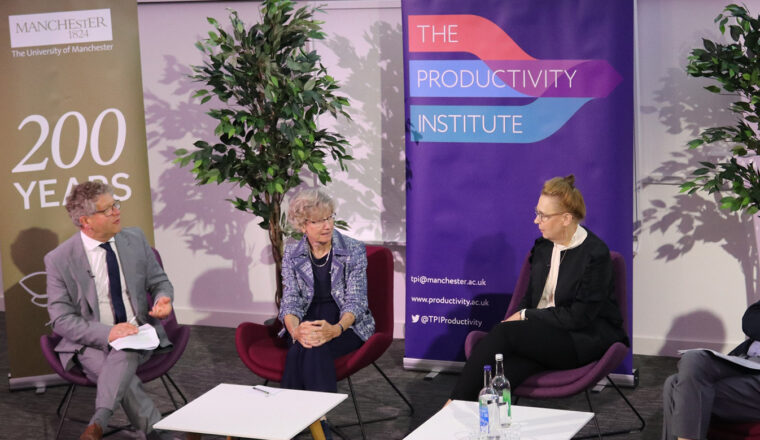Three Honorary Professors on Productivity appointed to support the work of The Productivity Institute
Alliance Manchester Business School (AMBS) at The University of Manchester is proud to announce the appointment of three new Honorary Professors to support the University’s research and engagement activities on productivity, innovation, business performance and economic growth.
Catherine L. Mann, Anthony J. Venables and Tera Allas will be associated with The Productivity Institute, a national research organisation headquartered at AMBS and funded by the Economic and Social Research Council (ESRC). The new appointees bring a wealth of experience and knowledge to their roles, which they will share with staff, students, policymakers, and practitioners engaged in shaping productivity policies and practices.
Below are personal statements regarding their appointment:
External Member of the Bank of England’s Monetary Policy Committee
Productivity growth is the essential element of economic performance that improves living standards. It has many dimensions and many sources. It can come from the business investment, innovation, and skills that transform products, processes, and workplace practices.
But it isn’t just an economic lens; productivity growth can be reflected in more time for creativity or leisure; and it is critical to address challenges such as climate change. The overall policy environment can support (or hinder) productivity growth, as does the structure of product and labour markets, such as the degree of competition. Productivity growth implies transformation, change, and opportunity. Along these dimensions, global engagement and domestic distribution topics loom large.
With my Honorary Professorship I would like to bring a broader understanding of the promise, prospects, and challenges of putting in place policies to support productivity growth, focusing in particular on the UK. I bring to my position perspectives and research background from multiple domains, including my work at the OECD, Citibank, Brandeis University, Peterson Institute for International Economics, and more than one central bank.
Senior Research Fellow in the Department of Economics at the University of Oxford
Poor productivity has held back the UK, relative to comparator countries, for a long time. The experience of the last 15 years demonstrates how much this matters. Without the economic growth that is brought by rising productivity, society struggles to meet many of its objectives, in public services, economic and political security, and in poverty reduction domestically and internationally.
Understanding productivity performance is a major intellectual challenge. Productivity cuts across many parts of the economy and requires analysis at many levels. It is easy to point to superficial causes, but hard to disentangle layers of causality. For example, productivity growth is slow because investment is low, but is investment low because of lack of supply of funds or lack of profitable investment projects? Regional inequalities drag down productivity and are persistent, but what is the combination of measures required to secure transformative change in a place? What are the high productivity opportunities for the UK, given changed trade policies by the UK and other countries?
These inter-related problems of economic growth, investment, regional inequalities, and trade have been addressed in my work, in a range of different contexts. Research work at the LSE concentrated on international trade and investment and on spatial issues, developing new approaches to economic geography.
As chief economist in the UK Department for International Development I worked on the practical issues of how to accelerate growth and investment in developing countries. At Oxford I worked on the structural issues faced by resource rich economies, and on UK regional inequalities and the roles of connectivity and transport. From 2020-22 I was research director at the start of The Productivity Institute (TPI), turning attention wholly to UK issues.
The Honorary Professorship support will support my continuing engagement with the work of TPI, offering both practical impact and intellectual challenge. Participation in seminars, a role as a ‘critical friend’ of TPI, and my own research – particularly on regional inequalities and on policy to ‘level up’ – will, I hope, contribute to the activities of the TPI, AMBS, and The University of Manchester as a whole.
Director of Research and Economics, McKinsey & Company, United Kingdom and Ireland
I am delighted to be appointed Honorary Professor at the Alliance Manchester Business School (AMBS), supporting The Productivity Institute’s research and engagement activities. This role is a great opportunity to contribute to TPI’s mission and the broader discourse on productivity, an area that has long been central to my professional interests.
Productivity growth is a cornerstone of UK’s prosperity, influencing our competitiveness, standard of living, and the economic health of the nation. As the UK’s population growth slows and its people age, productivity growth becomes even more crucial. Productivity growth can also contribute to environmental sustainability and wellbeing—not least by enabling society to deliver important non-market goods more effectively and efficiently.
In this context, the UK’s low productivity growth is concerning, if nothing new. Understanding productivity—at both micro and macro levels—was already a key element of my role as Deputy Head of the UK’s Government Economic Service and Director General at the (then) Department for Business and, subsequently, at the McKinsey Global Institute.
I have also been fortunate to lead McKinsey’s productivity-related collaborations with the CBI and with Be the Business, a charity set up by leaders from large multinational companies to help tackle poor productivity performance among the UK’s small and medium-sized enterprises.
At the heart of these research projects—on exports, regional growth, innovation, skills, management, leadership and organizational practices, government productivity, and technology adoption—has been the desire to find actionable solutions to the UK’s productivity issues. And, in my current role as Director of Research and Economics at McKinsey, interpreting macroeconomic patterns and their business implications, productivity remains a core topic of interest. While much work remains to be done, not least on systemic solutions, these efforts have formed a foundational evidence base which I hope has provided insights for the various government and academic advisory boards that I participate in.
These experiences, at the intersection of productivity-related business advice, public policy, and academic research, have enabled me to learn from a diverse range of stakeholders and recognise the complexity of the UK’s productivity problem. They have also convinced me of the crucial importance of TPI: its breadth of remit, its world-class talent, its research-driven agenda, its interdisciplinary nature, and its active engagement with key decision makers.
As Honorary Professor at AMBS, and as the Chair of TPI’s Advisory Committee, I look forward to contributing to TPI’s research agenda, capability building, outputs, and outreach. The Advisory Committee brings together international scholars, thought leaders, policy makers, and practitioners, whose insights and networks shape and support TPI’s activities. By identifying under-explored areas, collaborative opportunities, and policy priorities, and by helping articulate, position and champion TPI’s findings, the Advisory Committee can facilitate TPI’s endeavour to target its resources effectively and to maximise its impact.
I look forward to working together with colleagues at the AMBS, TPI, and beyond, to drive forward the research and engagement needed to address the UK’s productivity challenge.






